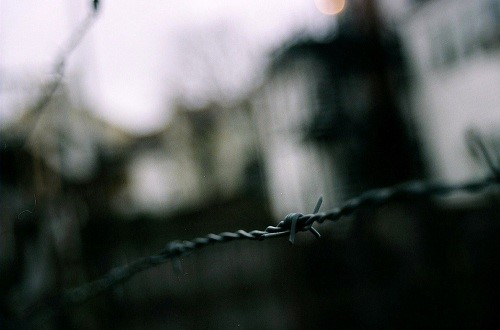 It stings the back of your throat, something sweet on the top of your mouth, the underbelly of your tongue. Squint through the thick gray air, the yellow haze of safety glasses. This is gunpowder, invading your lungs, combusting starchy smoke.
It stings the back of your throat, something sweet on the top of your mouth, the underbelly of your tongue. Squint through the thick gray air, the yellow haze of safety glasses. This is gunpowder, invading your lungs, combusting starchy smoke.
This was not your idea.
Even through the pillow mufflers over your ears, the bangs ring in your sinuses like a metal cup clanged on bar-like bones of your ribcage. Dusty stone walls hold in the shooting range and play catch with the bullet sounds. Casings clamor on the floor, glinting gold and spent.
You want to crouch, hold your arms above your head. You want to leave. But his hand lies heavy on your shoulder. A squeeze. A you’ll be fine. An I love you.
What really bothers you is the newness of it all. This should be old news to you, who fancied yourself born into war. You should know the taste of gun powder as it hits the back of your tongue. Unfamiliar, a challenge to the memories you thought were real. Maybe you made them up after all. Maybe you’re not the war survivor you thought you were.
You were just a kid. Maybe—you were wrong.
The blue plastic tote weighs down your hands. You set it on the counter of Lane 2. The Ruger is black with a silver barrel. Metal warmer than you expected, heavier than you expected.
Small and smooth, the gold bullets quiver in their Styrofoam holder. He shows you how to load them in the magazine. Your breath is shallow. He says, “Breathe.”
A bullet like this killed your uncle. You picture his blood glinting in the sunlight, staining his mother’s cement porch.
You hook a large, beige target on the line with clothespins. You send the target backward into the hazy lane. Twenty-five yards. It dances on the line, bounces on the breeze from the vents.
Now you doubt yourself. You remember—
You’re at a birthday get-together watching Turtles Can Fly, a documentary about Iraqi war children. Children and field mines are never a good combination, you know this—result in acres of small limbs strewn in intricate patterns. You sit through the movie thinking you don’t need this shit you don’t need this shit you want to go home you don’t fucking need this shit. If you can say it enough times then maybe you can convince yourself to leave. But it’s your friend’s birthday, and you’re already buzzed from beer so you stay.
After the film you lock yourself in the bathroom and throw up. The room is cramped, barely large enough for the toilet and sink. Open containers of make-up—half-used and half-rotten—spill over the faucets and crawl towards the drain. In your agitation you get foundation all over your arms, ten shades lighter than your skin.
You are shivering, but the heat in the house is on full blast. Your armpits are sweating but what do they know, right? They’re just armpits. They’re just doing their job. The chill is coming from inside, choking your veins as it works itself out, your teeth clattering and your body shaking.
—But maybe you were just sensitive. Maybe this didn’t happen, after all. Maybe you overreact.
You hold the Ruger in your hands. Slide your palm into the curve under the barrel. Wrap your fingers around the grip, hang your finger on the bottom of the trigger. Breathe in, out, hold. Pull.
The sound is louder than you expect. It vibrates in your ear drums, shakes the dust from the ceiling of your memories.
Fire. Breathe. Fire. Breathe. Fire.
He is there, behind you, watching with his arms crossed, smiling at the way the other men in the room stare at your small frame, back stiff with pride, shoulders knotted.
From this end of the gun, you feel different.
From this end of things, you can do more than survive.
A month later you are able to watch Saving Private Ryan. Even when he looks away squeamishly, you squint through the virtual smoke, watch the blood, determined, as bodies explode in geysers, red pixels pooling into sand. The shots no longer remind you of your uncle, or of the soldiers who marched through your town. You think instead of the sweet burn on your throat, glittering casings that tinkle as you push them aside with your foot, construction paper targets, metal warm and heavy in your hands.
—
SJ Sindu is a second-year MA student at the University of Nebraska-Lincoln, studying English with a concentration in creative writing. Sindu focuses on the traditionally silenced voices—the immigrant, the poor, the queer, the female-bodied, the non-Christian, the non-white. Sindu’s creative writing has appeared or is forthcoming in Harpur Palate, Sinister Wisdom, and elsewhere. Sindu is currently working on a novel and a collection of nonfiction essays.
Photo by Maria Romasco-Moore
